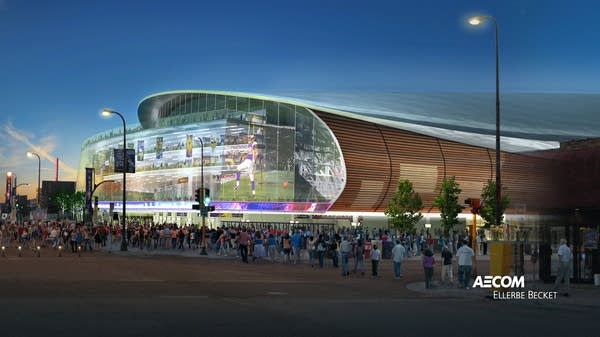Vikings officials cool on Minneapolis stadium plan
Go Deeper.
Create an account or log in to save stories.
Like this?
Thanks for liking this story! We have added it to a list of your favorite stories.

Minneapolis officials laid out their plans Monday to bid for a new home for the Minnesota Vikings.
The plan calls for a major reshuffling of the city's public facilities at a cost of $900 million, to be paid for with millions of dollars in sales taxes and fees, and a super-sized contribution — 45 percent — from the team.
The Vikings reacted unenthusiastically to the announcement.
"It won't work," said team Vice President Lester Bagley. "It's not something that the Vikings would support."
Turn Up Your Support
MPR News helps you turn down the noise and build shared understanding. Turn up your support for this public resource and keep trusted journalism accessible to all.
He said the $400 million upfront contribution was unacceptable, contrary to media reports and remarks by Rybak suggesting the team was amenable to the deal.
The Vikings initially offered to pay a third of the cost of a stadium.
Minneapolis would consolidate the operation of its major public facilities, including the Target Center and the Convention Center, under one new single authority, and rebuild the Metrodome for the Vikings.

The city would pay about $200 million. The state would refinance existing debt and pay $300 million of the project's cost. The Vikings would have to pay the rest, which would total at least $400 million.
"We're coming forward with a plan that will deliver not one, but two renovated sports facilities," said Minneapolis Mayor R.T. Rybak at an announcement of the plan Monday afternoon.
Rybak called the plan a game changer.
"This is going to do for football what we think Camden Yards did for baseball," Rybak said, referring to the Baltimore Orioles ballpark. "That urban park redesigned the way that people go to baseball games ... That's what we're going to do with this great urban facility, that will be woven into the infrastructure of the rest of city."
The city would pay for the plan with the half-cent sales tax that now pays the debt on the city's Convention Center, as well as millions of dollars in new taxes and fees, including an additional .015 percent sales tax in the city of Minneapolis.
The plan would also extend a 3 percent tax on downtown liquor and food sales, and apply it citywide. There would also be a $10 game-day surcharge on parking in lots and at meters, and a Vikings ticket tax.
Glen Taylor, the owner of the NBA's Timberwolves, said he and other Target Center tenants would kick in for the renovation of that facility, but Taylor declined to say how much since negotiations are ongoing.
The plan calls for the state to pay its $300 million share with a new sports memorabilia tax, a satellite TV tax, taxes on luxury stadium suites and proceeds of a lottery game.
Bagley also said that the team expected to lose $13 million a year in revenue playing at TCF Bank stadium, as they did in a game against the Chicago Bears last year. The Minneapolis plan would put the Vikings in the TCF Bank stadium for three years while a new NFL facility is being built where the Metrodome stands.
Team officials say the Minneapolis deal was presented to the Vikings just last week, and that there have been no negotiations on the details.
And there's a legal roadblock as well. The city has a 1997 charter amendment on the books, which requires a referendum on any city expenditures of more than $10 million for stadiums.
"That's a difficult situation we have," said Rybak. "We'll be dealing with the Legislature on that."
But Rybak ruled out a referendum.
"This will not be put to a vote. We're coming to the Legislature to ask them to allow us to move forward," he said.
Rybak said he thought residents would ultimately like the plan, because it sells off the city-owned Target Center and saves $50 million in property taxes over the next 10 years.
The plan comes as the Vikings and Ramsey County are talking about a deal for a potential stadium in Arden Hills, but the cost of road improvements along the Interstate 35W corridor would add at least $100 million to the cost of a stadium there.
That plan's most vocal backer, Ramsey County Commissioner Tony Bennett, said he thinks Arden Hills would be the best bet for the Vikings.
"It's a great site, and I think it's still in the running," said Bennett. "Do you want to be tucked away in a corner of Minneapolis, or do you want to come out on 160 acres where you can combine your corporate headquarters, your practice fields, have tailgating like other franchises across the country?"
The sponsors of the stadium bill at the Capitol haven't planned any hearings in response to the Minneapolis plan. Both have said they'd like to see the Vikings pick a local partner first.
Dear reader,
Political debates with family or friends can get heated. But what if there was a way to handle them better?
You can learn how to have civil political conversations with our new e-book!
Download our free e-book, Talking Sense: Have Hard Political Conversations, Better, and learn how to talk without the tension.





